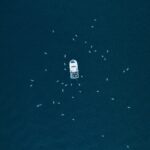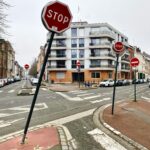

On the 24th of January, RPM Academy hosted an event in collaboration with Prof. Dr. Henk van Houtum. In this event, van Houtum presented his book titled “Free the Map”. This book explores borders, migration, and the role of cartography and geography in shaping our understanding of the world.
In the first part of the event, Prof. Dr. van Houtum declared that the world map we use in our day-to-day reflects and supports a dominant, state-centric narrative. He explained that traditional maps draw borders as rigid lines, reinforcing the idea that each nation is a homogenous entity. This has become normalized and accepted by most people, but serves as a problematic propaganda.
He then delved into the historical roots of the world map, which dates back to 1595. The Atlas, a collection of maps published by Mercator, is a compilation of European colonial knowledge on maps. This Eurocentric perspective shaped how power and governance were represented, privileging colonial powers and their territories by their portrayal as bigger countries.

Another problematic aspect of the world map is its failure to capture human experiences – emotions, movements, and identities – reducing the world to a static political structure. To illustrate this, van Houtum showed the audience the image of “This is Not a Pipe” – by Belgian surrealist painter René Magritte – and asked what it was. When most answered “a pipe”, he corrected them, explaining that it was merely a representation of a pipe, not an actual pipe. The same, he argued, applied to the world map – it is not the world map, but a representation shaped by a particular viewpoint.
The border map trap refers to immigration policies and border control that render immigration hard. This trap supports lines that represent fences, walls, etc. However, it overlooks the fact that lines are closed, whereas borders are both open and closed. And what does travel accessibility depend on? Who is allowed to cross these lines freely and ‘legally’ and who is blocked from doing the same? This is all rooted in European colonialism. The EU has a discriminatory visa border regime, which currently refers to people through categories such as “positive vs. negative” based on their nationality.

Van Houtum also discussed the “border map trap”, where maps depict borders as fixed lines (e.g., fences, walls, divisions) without acknowledging their fluidity. The accessibility of these borders, he argued, is deeply rooted in European colonialism. He stated that the EU’s visa border regime maintains discriminatory categories, which have historically divided the world.
Van Houtum also discussed the “border map trap”, where maps depict borders as fixed lines (e.g., fences, walls, divisions) without acknowledging their fluidity. The accessibility of these borders, he argued, is deeply rooted in European colonialism. He stated that the EU’s visa border regime maintains discriminatory categories, which have historically divided the world.

So, how can we challenge the dominant narratives surrounding the world map? Prof. Dr. van Houtum proposed counter-mapping, an approach that questions colonial representations and reimagines maps based on lived experiences. In the second part of the event, participants were invited to create their own maps without using lines. Instead, they focused on capturing people, emotions, and journeys. This exercise was eye-opening, demonstrating that the world map is not “the” map but merely one possible interpretation. The Atlas map – named after a Greek Titan from a bygone age – calls for renewal. In his place, Hermes – the agile Olympian god and protector of travellers – is proposed, by van Houtum, in revendication of such fixed, strict lines. As he concluded: “Free the map, free the Atlas. Welcome to Hermes”.

This article was written by Ana Lucía Zumarán Valencia and edited by Alaïa Lafleur. Photography by Romina Ortega Rico, Alaïa Lafleur, and Héléna Clinckart.